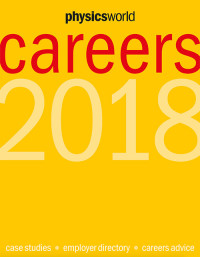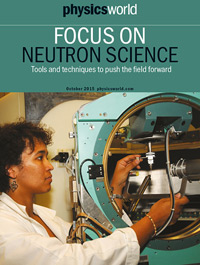Tag archives: physics
Got your physics degree… now what?
Last year, we launched our first ever Physics World Careers guide, which brought together all of our best content from the careers section of our monthly magazine, together with an extensive directory of employers. This year, we’re back with the bigger Physics World Careers guide 2018, packed with case-studies and analyses, to help you choose the right path for your future – as James McKenzie, vice-president for business at Institute of Physics point out in his foreword for the guide, “As physicists, you will have learnt to be logical, analytical and articulate. These are skills that are highly prized by employers and open up many career paths for you.”
View all posts by this author | View this author's profile
Why money is tight for Japanese science
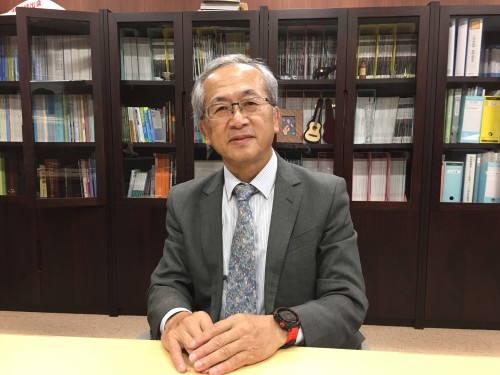
Money matters: Yasuhiro Iye is an executive director of the Japan Society for the Promotion of Science. (Courtesy: Matin Durrani)
By Matin Durrani in Tokyo, Japan
“Budget.”
That was the one-word answer from Yasuhiro Iye, when I asked him what was the most important thing on his mind as executive director of the Japan Society for the Promotion of Science (JSPS).
The society, which was founded in 1932, is responsible for funding researchers in Japan across all sectors of science, engineering and humanities. In 2015 the JSPS distributed about ¥260bn (about $2.27bn) in grants, which are awarded competitively through a rigorous peer-review process, with physicists receiving roughly 15% of the total.
It might sound a lot of money, but as Iye points out, the JSPS’s total budget has been pretty static in recent years. Money for science, Iye admits, is not as generous in Japan as in the past, which he blames on rising social-security costs to deal with the growing number of old people. “The Japanese government budget is constrained by the cost of an ageing society,” Iye says.
View all posts by this author | View this author's profile
The physics of sperm: the movie
By James Dacey
Luke Skywalker et al. re-entered the public imagination recently with the release of the trailer for Star Wars: the Last Jedi. But where that movie takes you on a galactic adventure, a new short web film by the Wyss Institute in the US takes you on a swashbuckling tour of the microscopic – tracking animated sperm on a mission to fertilize an egg.
The Beginning is based on collaborative work between a pair of researchers at the Wyss Institute for Biologically Inspired Engineering at Harvard University. Founding director Don Ingber teamed up with the biophysicist/professional animator Charles Reilly to seek an atomic-level understanding of sperm movement. Combining molecular dynamics simulations with film animation software, they have visualized how a sperm tail moves based on scientific data.
View all posts by this author | View this author's profile
Exploring Bristol’s physics heritage
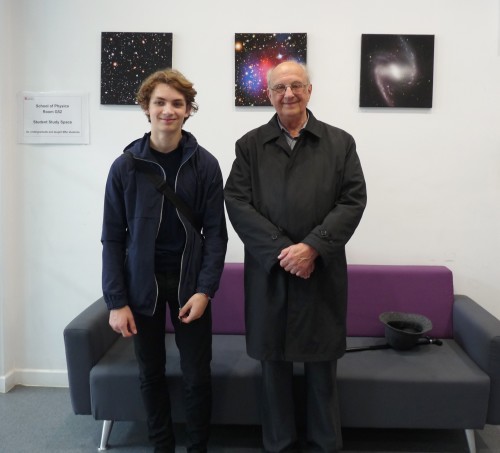
Meeting of minds: Sir John Enderby (right) was Felix James’ perfect physics tour guide. (Courtesy: Felix James)
By Felix James, a student on a work-experience placement with IOP Publishing
If you live in the UK, you are probably aware that at this time of year many school students are asked to do some kind of work experience. Teenagers like me find a placement we are interested in and then go there for a week – rather than school – to get a taste for what work is really like. For me this meant a week at IOP Publishing, which publishes Physics World, but it included an excellent tour of the physics department at the nearby University of Bristol.
View all posts by this author | View this author's profile
Sun, sea, sand – and science
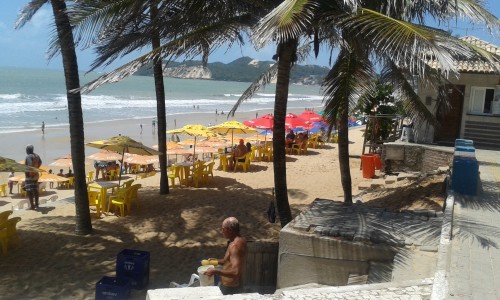
Paradise for physicists – the scene just metres from the venue for the 50th anniversary meeting of the Brazilian Physics Society in Natal.
By Matin Durrani in Natal, Brazil
From London via Lisbon, I arrived yesterday evening in Natal – a city of 800,000 people on the north-eastern tip of Brazil – for the 50th anniversary meeting of the Brazilian Physics Society (SBF).
I was invited by Ricardo Galvão, previous SBF president and chair of the organizing committee, to take part in a session later in the five-day meeting about the development of physics over the next two decades.
As editor of Physics World, which is published by the Institute of Physics (IOP), I’ll be joined by representatives from other physical societies around the world.
View all posts by this author | View this author's profile
Physics World 2015 Focus on Neutron Science is out now
By Michael Banks
For physicists who love scattering neutrons off materials, the recent ground-breaking ceremony at the European Spallation Source (ESS) in Lund, Sweden, will have been a long time coming. First proposed more than two decades ago, the ESS will – when it finally opens in 2020 – generate the world’s most intense beams of neutrons and help satisfy demand for these most useful of particles.
Neutron scattering has emerged as a mainstream scientific endeavour over the last 20–30 years, which is one reason why this month sees the first-ever Physics World focus issue on neutron science. We take a look at how researchers at the ESS are designing the facility’s tungsten target, as well as a new neutron source being built in China and how the ISIS Neutron and Muon Source in the UK is looking to bring in more users from industry.
View all posts by this author | View this author's profile
Friction between the sheets

Physics helps to explain why it is so hard to pull apart two interleaved phone directories. (CC BY SA Mark Longair)
By Michael Banks
Ever tried – and duly failed – to pull apart two interleaved phone books? Well, a team of researchers from France and Canada, led by Héctor Alarcón of the University Paris-Sud, has now studied why this is such an impossible task.
View all posts by this author | View this author's profile
Five celebrities who are quantum physicists in disguise
By James Dacey

(CC-BY Keven Law)
This week the Welsh pop star Charlotte Church (right) has released her latest EP entitled Four. In a conversation with New Scientist, Church explained that the EP’s opening track “Entanglement” was in fact named after the quantum-mechanical phenomenon known affectionately to physicists as “spooky action at a distance”. She has since told BBC Wales that she may well take her interest in science to the next level by studying for a physics degree.
There are of course several really famous people who are more directly connected with physics, having studied the subject in some form before going on to become luminaries in other fields. Examples include the Queen guitar-god Brian May, and arguably the most powerful woman in the world the German chancellor Angela Merkel. But Church is one of a new brigade of celebrities who are discovering the joys of physics after having already reached stardom for other abilities. The armchair psychologist might suggest that learning about the mechanics of the cosmos offers a refreshing alternative to the shallow nature of life that often comes with the celebrity lifestyle, or at least our view of it as presented by the media.
Making sense of physics information

(Courtesy: iStockphoto)
By James Dacey
Physicists today are faced with a multitude of options when it comes to accessing and sharing information with each other. Research collaborations are becoming increasingly international, bringing both opportunities and challenges with communication. There are ever-growing numbers of ways of accessing journal papers. And it seems that every other day sees the arrival of some shiny new social-media site for sharing and discussing the latest developments.
IOP Publishing (which publishes physicsworld.com) has teamed up with the Research Information Network (RIN) to try to improve our understanding of how information practices are changing in the physical sciences. You can help shape that understanding by taking our short survey. If you need a little sweetener, you will also be given the chance to enter a prize draw where you can win a $500 bursary to attend the academic conference of your choice. All in, the survey should take you about 10–15 minutes.
I caught up with Ellen Collins, a social researcher at RIN, to find out a bit more about what the project is designed to achieve.
View all posts by this author | View this author's profile
Physics on the big screen
By Tushna Commissariat
A new documentary of Stephen Hawking’s life is due in cinemas later this summer, with the esteemed physicist himself narrating the film. Hawking, as the documentary is simply dubbed, takes a personal look at the life of the celebrated scientist – his early days as a student in Oxford and his ongoing battle with motor neurone disease – as well as documenting his academic achievements.
View all posts by this author | View this author's profile
